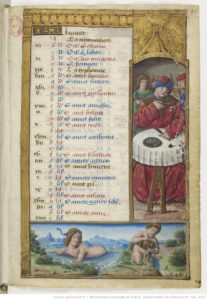
“January”, kalendar page from Les Petites Heures d’Anne de Bretagne (The Little Hours of Queen Anne of Bretagne), by the Maître des Triomphes de Pétrarque. From Bibliothèque nationale de France, Paris (France).
Aelred was part of the deputation that accompanied Walter, Archdeacon of York, to Rome, where Walter argued against the election of King Stephen’s nephew Henry de Sully as archbishop of York. The negotiations lasted several years, and eventually Henry’s election was quashed. (This may also have been because Henry wanted to continue to hold the abbacy of Fécamp Abbey in Normandy.)
Upon his return to Rievaulx, Aelred became novice master. He was subsequently appointed abbot of Revesby Abbey, a daughter house of Rievaulx in Lincolnshire, and eventually abbot of Rievaulx itself in 1147. Under Aelred’s rule, the abbey grew considerably, numbering some 140 monks and 500 lay brothers and other laymen.
Aelred is especially known for his influential books on spirituality, including Speculum caritatis (“The Mirror of Charity,” reportedly written at the request of Bernard of Clairvaux) and De spiritali amicitia (“On Spiritual Friendship”). Aelred also wrote seven works of history, including three books offering advice to Henry II of England on how to be a good king.
Aelred was never formally canonized, but his cult was officially recognized by the Cistercians in 1476. His commemoration is on January 12, the traditional date of his death.


